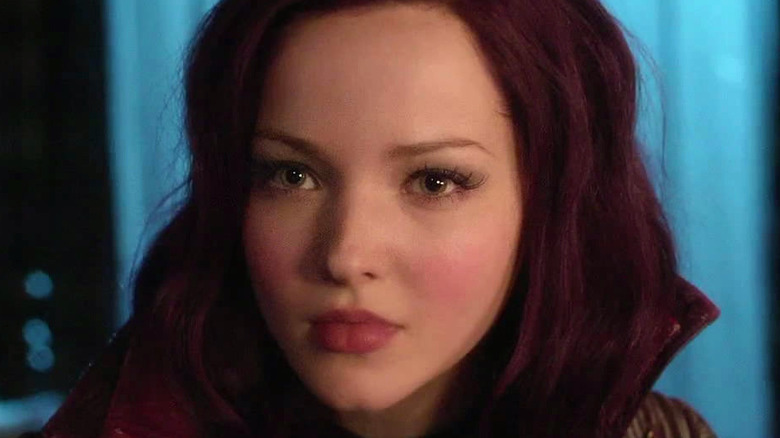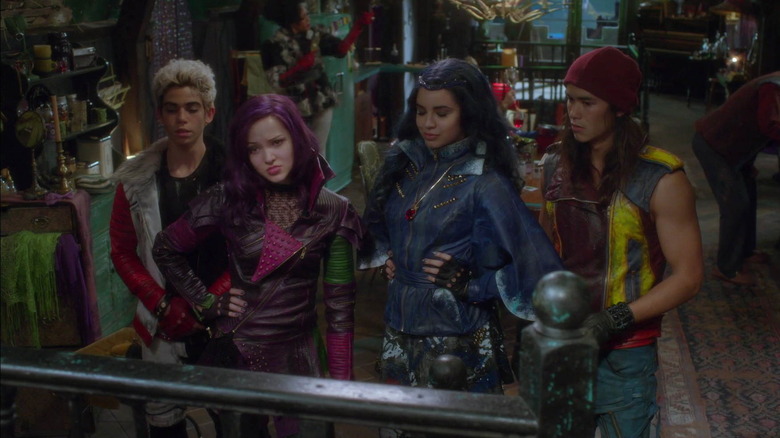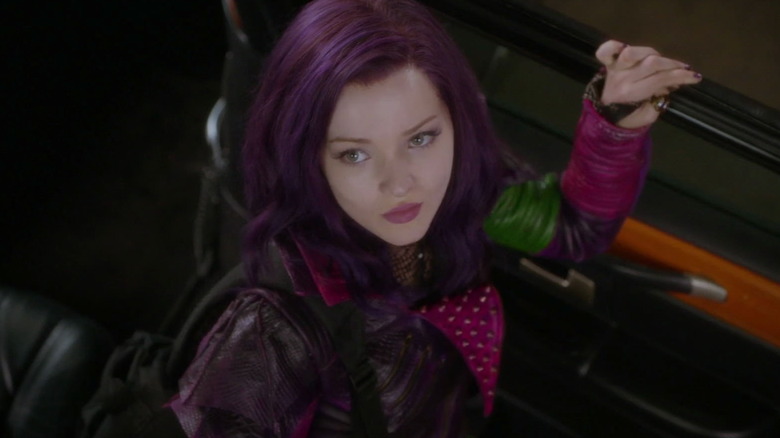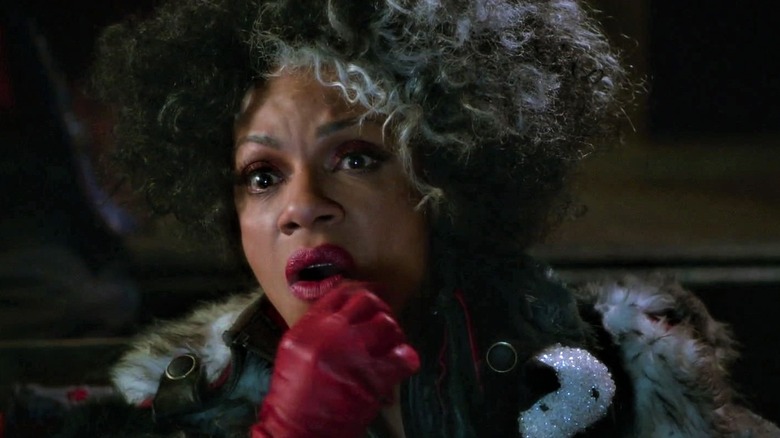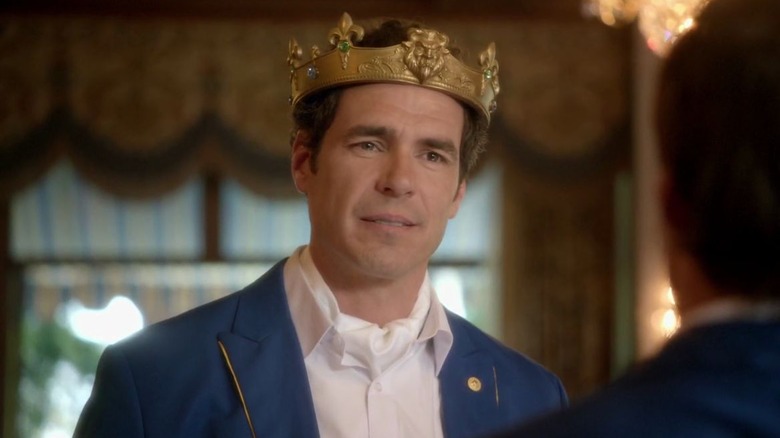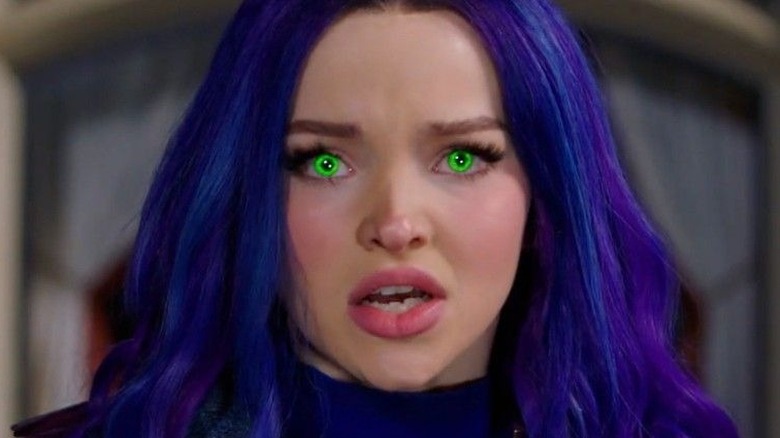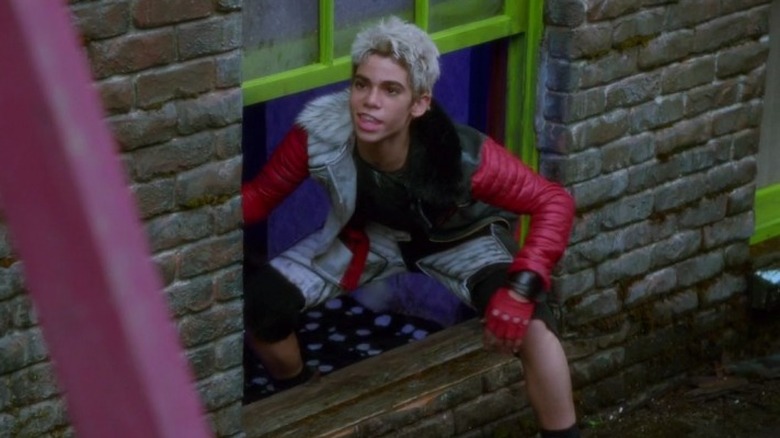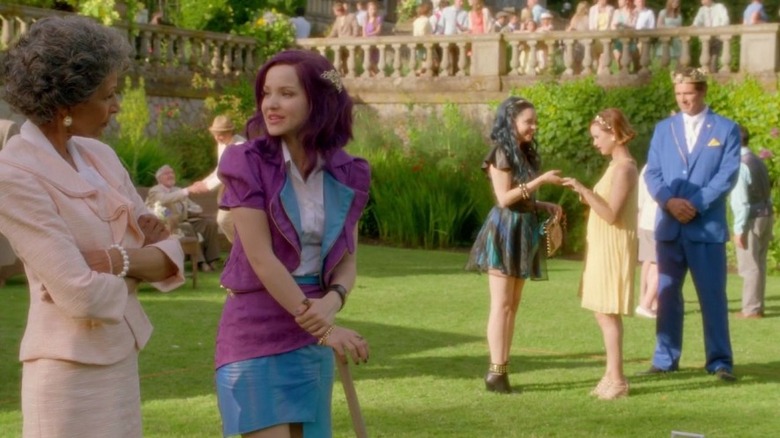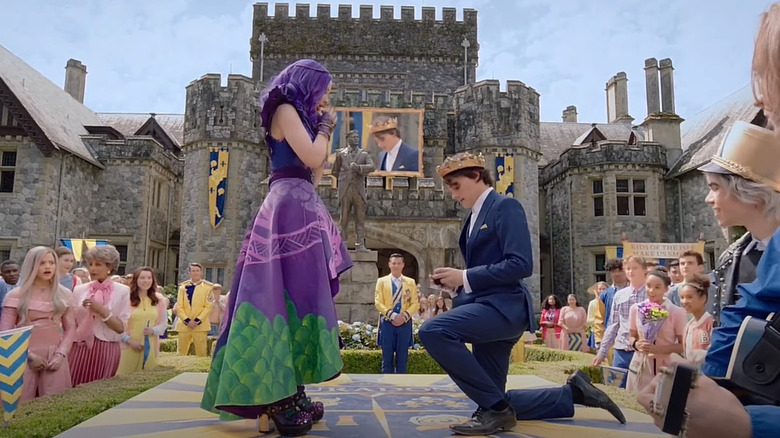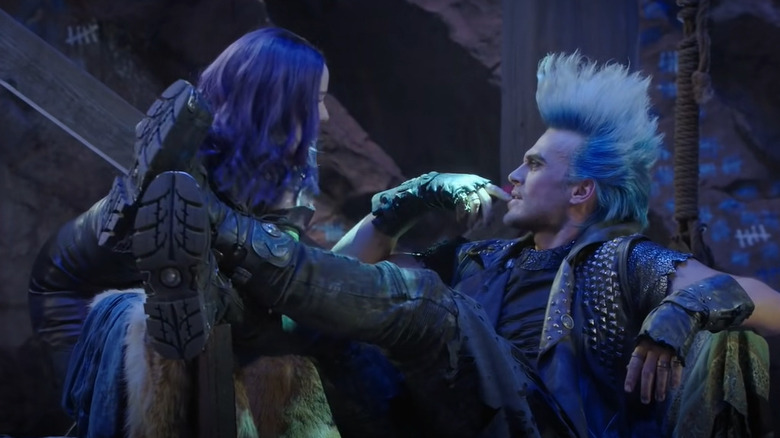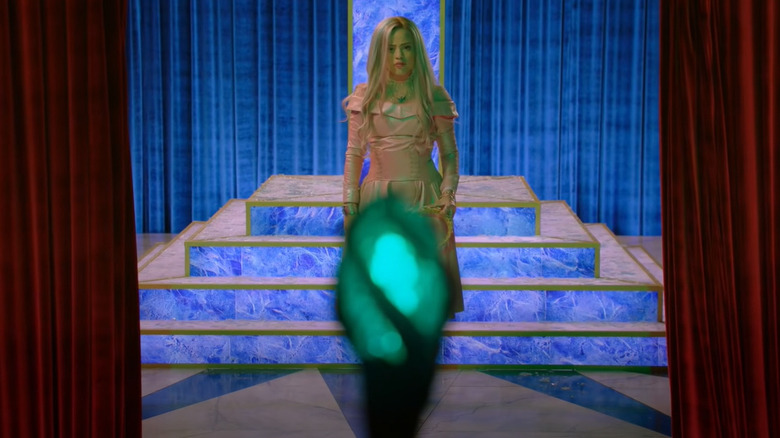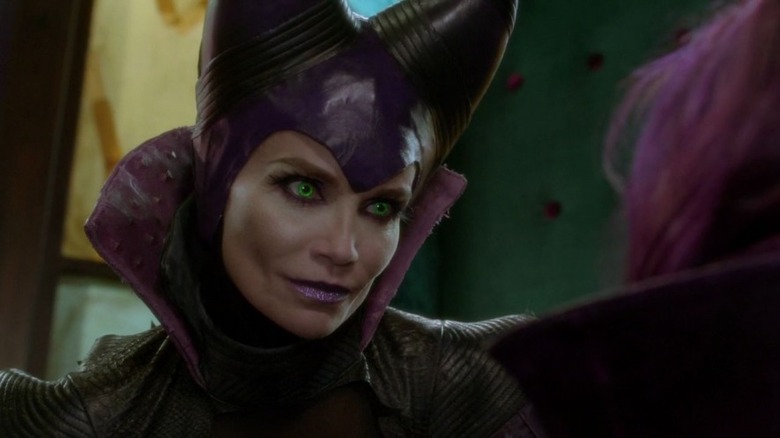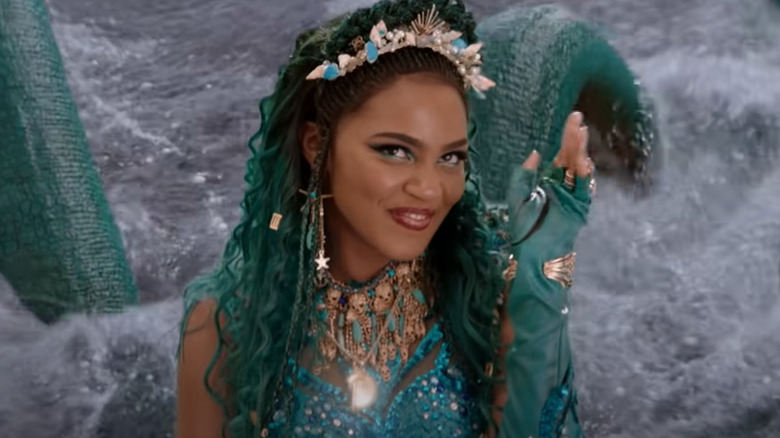Questionable Things We Ignored In The Descendants Movies On Disney
Ever since Disney released "Snow White and the Seven Dwarfs" in 1937, they've provided the world with an endless supply of heroes and villains. With a catalog as massive as Disney's, crossovers between properties were probably inevitable. But Disney movies also differ wildly in terms of region and time period — how is Mulan, who lives hundreds of years ago in China, supposed to meet Cruella, a denizen of 21st century London? Though this might seem like a logistical nightmare, Disney found a way to make it work in the "Descendants" movies.
The "Descendants" story stars the children of Disney's greatest villains, from Maleficent's daughter to Cruella de Vil's son. They live on the Isle of the Lost with all the other bad guys, while the good guys dwell in Auradon, a magical land made up of Disney's various fictional kingdoms. Mashing together so many different stories leads to plenty of fun, but also a whole lot of issues you might have missed. These are the questionable things we ignored in Disney's "Descendants" movies.
Auradon's impossible timeline
The "Descendants" timeline is chock-full of inconsistencies. Weirdly, the film refuses obvious opportunities to fix this: A throwaway line about all characters being subject to an anti-aging immortality spell, for example, could explain certain characters existing alongside each other. But no such explanation is ever offered. As a result, we watch Mulan's daughter reference her mom winning a war that happened hundreds of years ago in a class with Cruella's son. In what world could someone who skinned dogs in the 1960s and a warrior who lived centuries in the past have children the same age?
Things only get more confusing from there. None of the characters' clothing makes any sort of sense, given the eras they're meant to be from. The movies' location is even more confusing: According to their own lore, Belle and the Beast united many different fantasy kingdoms into the United States of Auradon. However, Auradon appears to cover a very limited area and contain a small number of people. Where did everyone go — and when?
Love potions aren't cute, Mal
Nothing good comes from love potions, but no one appears to have told Mal, Maleficent's daughter. When she gets to Auradon Prep in the first film, her brilliant plan to steal the Fairy Godmother's wand hinges on whammying Ben, the Beast's son and the future king, with a love potion.
Putting a spell on someone to make them fall in love with you is not exactly the stuff fairy tales are made of. Instead of wedding bells, you might expect to be slapped with a restraining order. But when the love potion wears off in the Enchanted Lake, rather than have a justifiably appalled reaction, Ben says nothing. He only reveals that he knows about Mal's conniving plan later on, when she feeds him the antidote.
Ben's reaction to his girlfriend taking away his consent and ability to think clearly? Oh, he totally gets it. Who wouldn't be terrified to ask out the almighty future king, right? This is nowhere near healthy, and Mal's actions shouldn't be brushed under the rug. Some therapy and a stern lecture on consent in order, not a happily-ever-after.
Dogs are people, too
If your parent spent your entire childhood spewing ridiculous tales about the evil nature of dogs, you'd probably end up afraid of them. Cruella's son Carlos has indeed absorbed his mother's many batty, dog-hating ramblings, and, having never actually met a dog before, he's inclined to believe her. Yet when he meets the Auradon Prep pup, Dude, he's given some "alone time" with the animal with zero monitoring.
Sure, the whole point of Ben's mandate to let some villain kids enter Auradon is to give them a second chance. But this is still a pretty bad idea on multiple levels. These kids have had their sense of self (and sense of the world) warped by the most notorious villains around — it's not exactly a swell idea to immediately put them in a position to follow in their parents' footsteps. Carlos certainly deserves the chance to prove himself, but maybe not right away, or at the potential expense of an innocent dog. There's giving someone a second chance, and then there's straight-up negligence.
A king who hasn't even finished puberty
There have been numerous child kings throughout history. That was par for the course back in the day, when life expectancy was abysmal and the continuity of a royal line had to be ensured. It was never the goal, though — no one wants to be ruled by a child. In many such cases, the child ruler had an adult regent, who lead the kingdom in their stead.
Not so in "Descendants," however: Ben gets sworn in as King of Auradon at 16 years old. The Beast, his father and the king, appears to be in his late '40s or early '50s. He's also perfectly healthy, and more than capable of carrying out the kingly duties he already shoulders. Ben should certainly be training to be king, but no one in their right mind would want to swear him in when there's absolutely nothing stopping the current king from ruling. Sure, these movies are all about passing the torch to the next generation, but this is just asking for a disaster.
Mal's actions conflict with the movies' moral
The moral of "Descendants 2" is accepting yourself for who you are. But in the end, Mal gives her book of magic to the Fairy Godmother to embrace her "goodness." The entire movie suggests that magic doesn't make anyone evil — it's what you do with it that counts. Moreover, magic is a big part of Mal's life, and were she to embrace it, rather than shove it away, she could use it to help Auradon. But Auradon would rather Mal reject magic altogether. This leaves the land defenseless against people who use dark magic, like Mal's mother, in addition to being in total opposition to the movie's moral.
The "Descendants" movies' magical message is murky, to say the least. We see Mal go back and forth between embracing and rejecting who she is, sending a confusing and convoluted message to the young audience tuning in. Everyone has something they struggle to accept about themselves, but Mal's actions are out of step with the story's purported themes. Given that this is a Disney production, you might expect them to do a better job.
Carlos gets straightwashed
In the first "Descendants" film, Carlos shows zero interest in girls. He does, however, have an adorably awkward moment with a male student who introduces him to Dude the dog. Flirting happens, and both get flustered ... and it never gets addressed again. Out of nowhere, in "Descendants 2," Carlos has his eyes set on Jane. When Carlos poorly attempts to ask her out, he's just as goofy as he is with the male student.
This is a pretty egregious case of straightwashing. In fiction, straightwashing is the act of erasing a character's previously established LGBTQ+ identity. Context makes Carlos' straightwashing even worse: The only LGBTQ+ representation present in the "Descendants" movies is Harry Hook, who's implied to be bisexual, and the moment between Carlos and the student, which goes nowhere. Disney had the chance to introduce an LGBTQ+ character in Carlos, but in the end, they flaked.
Auradon is a classist nightmare
Auradon is portrayed as an ideal kingdom with no major issues, but its peace is clearly achieved through overt classism. The solution to all of Auradon's problems seems to be chucking them far away: They eternally cast aside anyone who doesn't fit into their cookie-cutter idea of goodness, including children who have done nothing wrong. Then, they laud themselves as heroes for throwing a bone to a few underprivileged kids from the Isle of the Lost, despite the fact that this still leaves a whole host of others in squalor.
There aren't that many kids on the Isle of the Lost — it wouldn't be a massive undertaking to just let them all in to Auradon at once. And again, these kids have been condemned purely because of their parents' actions. But the "good" guys refuse to do so, and even pat themselves on the back for doing the bare minimum. What's worse, they make a performative show of their "goodness" by airing it on TV. Adults might find themselves wondering if this is a Disney movie or "The Hunger Games."
Mal and Ben's teen wedding
We may not be entirely sure how old the characters are in "Descendants 3," but the movie is implied to take place no more than a year after "Descendants 2," in which the characters are 17 and still in school. In fact, as the king offers Dizzy acceptance into Auradon Prep at the end of the second movie and she still hasn't arrived in the third movie, it appears that only a summer passes between the two films.
Given that timeline, when Mal and Ben get engaged at the beginning of "Descendants 3," they can't be more than 17 or 18. In some moments of the third movie, it even seems like they're still in school. It's bad enough that Ben takes the throne at 16, there's no reason he needs to get married at such a young age too. What the point in rushing things? Both Mal and Ben still have some growing up to do, the prior king is still alive, and Ben has plenty of time to produce an heir. We expect modern versions of fairy tales to adapt to the times by, among other things, not featuring incredibly young brides and grooms. Yet "Descendants" does just that. Telling kids they have to lock down their childhood sweetheart before graduating high school is not exactly a great message.
An anthem for awful parents
In his song "Do What You Gotta Do," Hades makes a ton of excuses for being an absentee father to Mal. While she calls him out for bailing on her, he applauds himself for how much stronger it's made her. Hades is one of the best villains in Disney history, but his comments are classically manipulative, and geared entirely towards making himself feel better. Anyone who's been through what Mal has is familiar with this song and dance. Not only is it frustrating, it completely invalidates the damage abandonment inflicts on self-worth and self-image. Hades doesn't really care about Mal's strength — he just wants to keep himself from feeling uncomofortable.
This entire duet is a terrible message to send to young viewers, many of whom are dealing with the same sort of issue. At one point, Hades actually says, "You're stronger with those daddy issues." Yikes doesn't even begin to cover it. No, Hades, you haven't given Mal everything by giving her nothing. She spends the entire series unlearning this. Let's not give abusers credit for the hard work their victims do to become stronger individuals. Hades has taken enough from her — he doesn't get to steal this too.
No consequences for misbehaving royals
Rigid hierarchy rears its ugly head again when Aurora's daughter Audrey takes the entire kingdom hostage. Audrey steals Maleficent's wand and puts a sleeping curse on everyone, which causes general mayhem. Keep in mind, her family still holds a grudge against Maleficent for her sleeping spell shenanigans. Moreover, in addition to targeting the Auradon Prep students, she goes after Mal, the kingdom's future queen, and the king himself. Her behavior is right in line with the crimes that got villains chucked onto the Isle of the Lost.
But after Mal saves the day, Audrey is basically let off the hook. What makes her different? She's Sleeping Beauty's daughter, of course. Hades lightly brings up this hypocrisy by pointing out that when the royals get villain-y, they're making mere mistakes, but when villains do it, they get locked away forever. Audrey doesn't even get a slap on the wrist, and is allowed to attend the post-sleeping curse celebration. You know, the curse that she caused.
Mal sets the people of the Isle up for failure
It makes sense that after years of unfair treatment on the Isle, Mal would want to make things better. But Mal's solution to Auradon and the Isle's discord is simply letting all of the villains out of the Isle. Her hastiness to take down the barrier between Auradon and the Isle is an overcorrection done on a whim, with no provisions provided to make things safe for everyone — the villains included. This is pretty much guaranteed to backfire.
Denizens of Auradon are full of disdain for Isle kids — and they aren't even the ones guilty of villainous crimes. This divide will inevitably cause animosity between the two groups. If Mal had done an ounce of planning ahead of time, she could have created programs for Auradon's newest citizens, put safeguards in place, and worked on getting the people of Auradon on board, ensuring a well-informed transition. But none of that happens. Taking down the barrier without a plan in place isn't just a bad idea — it's setting the people of the Isle up for failure. You can't just sing "Kumbaya" and expect everything to be perfect, especially when you have a lady who skins dogs for fun and a queen who enjoys poisoning people with apples!
Nearly all of the Black women are villains
While there's more representation in the "Descendants" movies than there is many other Disney productions, here's a plainly awful fact: There are only five major Black women and girls in the series, and four are introduced as villains. Cruella is infamous for skinning dogs. Audrey is the main antagonist of the first and third movies. Audrey's grandmother spews hatred against the Isle kids. Uma is the daughter of Ursula and the main antagonist of the second film. Taken together, this puts a hideous message in kids' heads.
All of these characters, except Cruella, eventually get mild redemption arcs. But the trend at work is undeniable. Even worse, none of these characters are fully redeemed until the final movie: This heinous representation is an issue until the last 30 minutes of the series. Celia, a villain kid introduced in the third film, is the only Black girl who starts out as a protagonist, but even she's the daughter of Dr. Facilier, villain of "The Princess and the Frog."
